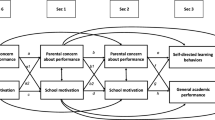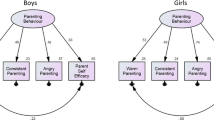Abstract
The present study examined the development of perceived parental self-efficacy in school-related performance (PPSE-School; i.e., parents’ beliefs in their capabilities to positively affect their children’s academic experience) during secondary school as well as its longitudinal associations with adolescents’ academic achievement at the end of secondary school. Participants were 482 (53.9% boys) Italian adolescents and their parents (376 mothers; 106 fathers). PPSE-School was measured across three-time points over 3 years, when adolescents attended grades six (T1), seven (T2), and eight (T3) of secondary school. Adolescents’ school grades were collected at the beginning and the end of secondary school. Second Order Latent Growth Curve Modeling indicated a linear decrease in PPSE-School over the transition to secondary school. The slope of PPSE-School positively predicted students’ academic achievement in grade eight while controlling for grade six academic achievement, students’ gender, socio-economic status, and the type of school. The study implications are discussed.
Highlights
-
This study aims at examining the development of parental self-efficacy during secondary school.
-
Latent curve modeling indicated a linear decrease in parental self-efficacy.
-
Higher increases in parental self-efficacy predicted higher academic performance.
-
Results support the importance of parents’ beliefs in helping students succeed.

Similar content being viewed by others
References
Ardelt, M., & Eccles, J. S. (2001). Effects of mothers’ parental efficacy beliefs and promotive parenting strategies on inner-city youth. Journal of Family Issues, 22(8), 944–972. https://doi.org/10.1177/019251301022008001.
Ballenski, C. B., & Cook, A. S. (1982). Mothers’ perceptions of their competence in managing selected parenting tasks. Family Relations, 31(4), 489–494. https://doi.org/10.2307/583923.
Bandura, A. (1982). Self-efficacy mechanism in human agency. American Psychologist, 37(2), 122–147.
Bandura, A. (1990). Reflections on notability determinants of competence. In R. J. Sternberg & J. Kolligian, Jr (Eds.), Competence Considered (pp. 161–191). Cambridge, U.K: Cambridge University Press.
Bandura, A., Barbaranelli, C., Caprara, G. V., & Pastorelli, C. (1996). Multifaceted impact of self-efficacy beliefs on academic functioning. Child Development, 67(3), 1206–1222. https://doi.org/10.2307/1131888.
Bandura, A. (1997). Self-efficacy: The exercise of control. New York, NY US: Freeman.
Bandura, A. (2006). Adolescent development from an agentic perspective. Self-Efficacy Beliefs of Adolescents, 5, 1–43.
Bear, G. G., & Watkins, J. M. (2006). Developing self-discipline. Children’s needs III: Development, prevention, and intervention (pp. 29–44). Washington, DC, USA.
Bi, T., Zhang, T., He, S., Guo, X., Liu, C., Liu, X., & Luo, L. (2021). Trajectories of paternal self-efficacy for educational involvement in late childhood: Effects of fathers’ time and energy. Journal of Family Psychology. Advance online publication. https://doi.org/10.1037/fam0000840.
Bogenschneider, K., Small, S. A., & Tsay, J. C. (1997). Child, parent, and contextual influences on perceived parenting competence among parents of adolescents. Journal of Marriage and the Family, 59(2), 345–362. https://doi.org/10.2307/353475.
Bollen, K. A., & Curran, P. J. (2006). Latent curve models: a structural equation perspective (Vol. 467). New York: Wiley.
Boonk, L., Gijselaers, H. J., Ritzen, H., & Brand-Gruwel, S. (2018). A review of the relationship between parental involvement indicators and academic achievement. Educational Research Review, 24, 10–30. https://doi.org/10.1016/j.edurev.2018.02.001.
Bücker, S., Nuraydin, S., Simonsmeier, B. A., Schneider, M., & Luhmann, M. (2018). Subjective well-being and academic achievement: a meta-analysis. Journal of Research in Personality, 74, 83–94. https://doi.org/10.1016/j.jrp.2018.02.007.
Caprara, G. V., Vecchione, M., Alessandri, G., Gerbino, M., & Barbaranelli, C. (2011). The contribution of personality traits and self-efficacy beliefs to academic achievement: a longitudinal study. British Journal of Educational Psychology, 81(1), 78–96. https://doi.org/10.1348/2044-8279.002004.
Caprara, G. V., Gerbino, M., Kanacri, B. P. L., & Vecchio, G. M. (2014). Educare alla prosocialità: teoria e buone prassi. Pearson Italia. Turin, Italy.
Castellani, V., Pastorelli, C., Eisenberg, N., Gerbino, M., Di Giunta, L., Ceravolo, R., & Milioni, M. (2014). Hostile, aggressive family conflict trajectories during the transition to adulthood: associations with adolescent Big Five and emerging adulthood adjustment problems. Journal of Adolescence, 37(5), 647–658. https://doi.org/10.1016/j.adolescence.2013.12.002.
Coleman, P. K., & Karraker, K. H. (1997). Self-efficacy and parenting quality: findings and future applications. Developmental Review, 18(1), 47–85. https://doi.org/10.1006/drev.1997.0448.
Coleman, P. K., & Karraker, K. H. (2003). Maternal self‐efficacy beliefs, competence in parenting, and toddlers’ behavior and developmental status. Infant Mental Health Journal, 24(2), 126–148. https://doi.org/10.1002/imhj.10048.
Crocetti, E., Cherubini, E., & Palmonari, A. (2011). Percezione di sostegno sociale e stili di identità in adolescenza. Psicologia Clinica Dello Sviluppo, 15(2), 353–378.
Curran, P. J., West, S. G., & Finch, J. F. (1996). The robustness of test statistics to nonnormality and specification error in confirmatory factor analysis. Psychological Methods, 1(1), 16–29.
Donovan, W. L., Leavitt, L. A., & Walsh, R. O. (1997). Cognitive set and coping strategy affect mothers’ sensitivity to infant cries: a signal detection approach. Child Development, 68, 760–772. https://doi.org/10.1111/j.1467-8624.1997.tb01960.x.
Durlak, J. A., Mahoney, J. L., & Boyle, A. E. (2022). What we know, and what we need to find out about universal, school-based social and emotional learning programs for children and adolescents: a review of meta-analyses and directions for future research. Psychological Bulletin, 148(11-12), 765 https://doi.org/10.1037/bul0000383.
Eccles, J. S., & Harold, R. D. (1993). Parent-school involvement during the early adolescent years. Teachers College Record, 94(3), 568–587.
Endendijk, J. J., Groeneveld, M. G., Bakermans-Kranenburg, M. J., & Mesman, J. (2016). Gender-differentiated parenting revisited: Meta-analysis reveals very few differences in parental control of boys and girls. PLoS ONE, 11(7), 1–33. https://doi.org/10.1371/journal.pone.0159193.
Enders, C. K. (2010). Applied missing data analysis. New York, United States: Guilford Press.
Epstein, J. L. (1986). Parents’ reactions to teacher practices of parent involvement. The Elementary School Journal, 86(3), 277–294. https://doi.org/10.1086/461449.
Eurydice (2021). La struttura del sistema di istruzione e formazione. Publications Office of the European Union 2021. https://eacea.ec.europa.eu/national-policies/eurydice).
Fan, W., & Williams, C. M. (2010). The effects of parental involvement on students’ academic self‐efficacy, engagement and intrinsic motivation. Educational Psychology, 30(1), 53–74. https://doi.org/10.1080/01443410903353302.
Geiser, C., Keller, B., & Lockhart, G. (2013). First- versus second-order latent growth curve models: Some insights from latent state-trait theory. Structural Equation Modeling, 20(3), 479–503. https://doi.org/10.1080/10705511.2013.797832.
Glatz, T., & Buchanan, C. M. (2015). Change and predictors of change in parental self-efficacy from early to middle adolescence. Developmental Psychology, 51(10), 1367–1379. https://doi.org/10.1037/dev0000035.
Gross, D., Fogg, L., & Tucker, S. (1995). The efficacy of parent training for promoting positive parent-toddler relationships. Research In Nursing & Health, 18(6), 489–499. https://doi.org/10.1002/nur.4770180605.
Hill, N. E., & Tyson, D. F. (2009). Parental involvement in middle school: a meta-analytic assessment of the strategies that promote achievement. Developmental Psychology, 45(3), 740–736. https://doi.org/10.1037/a0015362.
Hoover-Dempsey, K. V., Battiato, A. C., Walker, J. M., Reed, R. P., DeJong, J. M., & Jones, K. P. (2001). Parental involvement in homework. Educational Psychologist, 36(3), 195–209. https://doi.org/10.1207/S15326985EP3603_5.
Istituto Italiano di Statistica [National Institute of Statistics]. (1995). Annuario statistico italiano 1995 [Italian yearbook of statistics 1995]. Rome: ISTAT.
Jones, T. L., & Prinz, R. J. (2005). Potential roles of parental self-efficacy in parent and child adjustment: A review. Clinical Psychology Review, 25(3), 341–363. https://doi.org/10.1016/j.cpr.2004.12.004.
Junttila, N., & Vauras, M. (2014). Latent profiles of parental self‐efficacy and children’s multisource‐evaluated social competence. British Journal of Educational Psychology, 84(3), 397–414. https://doi.org/10.1111/bjep.12040.
Kelloway, E. K. (1998). Using LISREL for structural equation modeling: A researcher’s guide. Thousand Oaks, CA: Sage.
Kline, R. B., Thompson, B., & Subotnik, R. E. (2010). Promise and pitfalls of structural equation modeling in gifted research. Methodologies for Conducting Research on Giftedness (pp. 147–169). Washington, DC: American Psychological Association.
Li, X., Han, M., Cohen, G. L., & Markus, H. R. (2021). Passion matters but not equally everywhere: predicting achievement from interest, enjoyment, and efficacy in 59 societies. Proceedings of the National Academy of Sciences, 118(11), 1–10. https://doi.org/10.1073/pnas.2016964118.
Morini, E., & Rossi, F. (2016). Il modello INDIRE. Professionalità, strumenti e metodi per l’attivazione di un processo di miglioramento continuo nelle scuole. Scuola Democratica, 7(2), 487–506.
Mullins, E. R., & Irvin, J. L. (2000). Transition into middle school. Middle School Journal, 31(3), 57–60. https://doi.org/10.1080/00940771.2000.11494629.
Muthén, L. K., & Muthén, B. O. (2017). Version 8 Mplus user’s guide. Los Angeles, CA: Muthén & Muthén, Author.
Pajares, F., & Schunk, D. (2001). The development of academic self-efficacy. Development of Achievement Motivation. United States, 30, 1–27.
Pastorelli, C., & Gerbino, M. (2001). Autoefficacia genitoriale [Parental Self-Efficacy]. In G. V. Capara (Ed.), La valutazione dell’autoefficacia [Self-Efficacy Assessment] (pp. 47–92). Trento, Italy: Erikson..
Sanders, M. R., & Mazzucchelli, T. G. (2013). The promotion of self-regulation through parenting interventions. Clinical Child and Family Psychology Review, 16, 1–17.
Sirin, S. R. (2005). Socioeconomic status and academic achievement: a meta-analytic review of research. Review of Educational Research, 75(3), 417–453. https://doi.org/10.3102/00346543075003417.
Smetana, J. G. (1988). Concepts of self and social convention: adolescents’ and parents’ reasoning about hypothetical and actual family conflicts. In M. R. Gunnar & W. A. Collins (Eds.), Minnesota symposia on child psychology (pp. 79–122). New Jersey, United States: Psychology Press. Vol. 21.
Smetana, J. G., Campione-Barr, N., & Metzger, A. (2006). Adolescent development in interpersonal and societal contexts. Annual Review of Psychology, 57, 255–284. https://doi.org/10.1146/annurev.psych.57.102904.190124.
Shumow, L., & Lomax, R. (2002). Parental efficacy: predictor of parenting behavior and adolescent outcomes. Parenting: Science and Practice, 2(2), 127–150. https://doi.org/10.1207/S15327922PAR0202_03.
Steinberg, L., & Morris, A. S. (2001). Adolescent development. Annual Review of Psychology, 52(1), 83–110.
Steenkamp, J. B. E., & Baumgartner, H. (1998). Assessing measurement invariance in cross-national consumer research. Journal of Consumer Research, 25(1), 78–90. https://doi.org/10.1086/209528.
Teti, D. M., & Gelfand, D. M. (1991). Behavioral competence among mothers of infants in the first year: the mediational role of maternal self‐efficacy. Child Development, 62(5), 918–929. https://doi.org/10.2307/1131143.
Vandenberg, R. J., & Lance, C. E. (2000). A review and synthesis of the measurement invariance literature: Suggestions, practices, and recommendations for organizational research. Organizational Research Methods, 3(1), 4–70. https://doi.org/10.1177/109442810031002.
Vyas, S., & Kumaranayake, L. (2006). Constructing socio-economic status indices: how to use principal components analysis. Health Policy and Planning, 21(6), 459–468. https://doi.org/10.1093/heapol/czl029.
Weaver, C. M., Shaw, D. S., Dishion, T. J., & Wilson, M. N. (2008). Parenting self-efficacy and problem behavior in children at high risk for early conduct problems: The mediating role of maternal depression. Infant Behavior and Development, 31(4), 594–605. https://doi.org/10.1016/j.infbeh.2008.07.006.
Wilder, S. (2014). Effects of parental involvement on academic achievement: a meta-synthesis. Educational Review, 66(3), 377–397. https://doi.org/10.1080/00131911.2013.780009.
Funding
This research was supported by grants from the Grant Foundation and the Spencer Foundation to Albert Bandura, the Ministero dell’Istruzione dell’Università e della Ricerca (MIUR) to Gian Vittorio Caprara, and from Sapienza University of Rome (Ateneo Research) to Concetta Pastorelli.
Author information
Authors and Affiliations
Corresponding author
Ethics declarations
Conflict of Interest
The authors declare no competing interests.
IRB Approval
This study was conducted in Italy between 1990 and 2008 and consisted of free and unconstrained parent and children questionnaires. According to the regulations in Italy, there was no requirement for an ethics committee approval when the study was conducted in the years 1990-2000. However, the study fully complied with the Italian law on Privacy (Law December 31st, 1996, n. 675) and the Ethical Code of Conduct for Psychologists of the Italian Society for Psychology and the Ethical standards of the American Psychological Association. For later assessments, IRB was obtained in 2008, when the Department of Psychology, Sapienza University of Rome introduced it.
Additional information
Publisher’s note Springer Nature remains neutral with regard to jurisdictional claims in published maps and institutional affiliations.
Supplementary information
Rights and permissions
Springer Nature or its licensor (e.g. a society or other partner) holds exclusive rights to this article under a publishing agreement with the author(s) or other rightsholder(s); author self-archiving of the accepted manuscript version of this article is solely governed by the terms of such publishing agreement and applicable law.
About this article
Cite this article
Lunetti, C., Pastorelli, C., Zuffianò, A. et al. Parental Self-efficacy in School-related Performance: Development and Association with Academic Achievement during Secondary School. J Child Fam Stud 33, 849–862 (2024). https://doi.org/10.1007/s10826-023-02752-4
Accepted:
Published:
Issue Date:
DOI: https://doi.org/10.1007/s10826-023-02752-4




